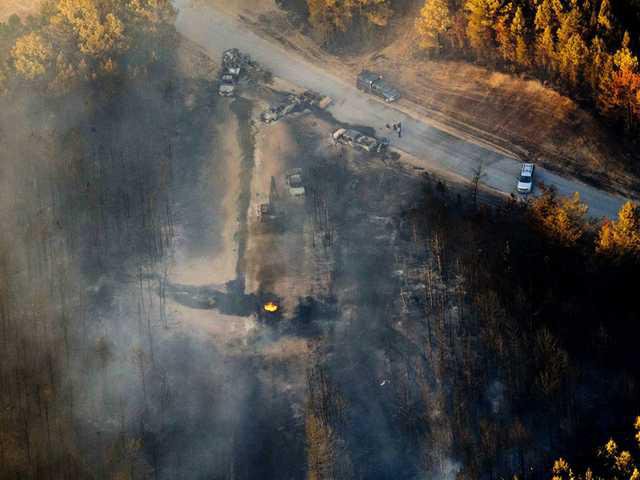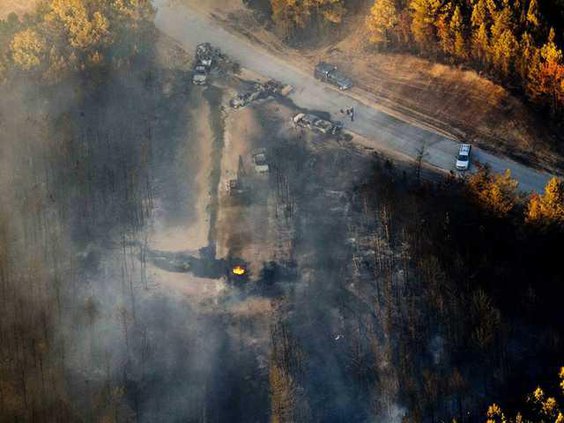HELENA, Ala. — A fatal explosion that sparked a geyser of fire has shut down a vital pipeline supplying gasoline to millions of people across the Southeast, raising fears of another round of gas shortages and price increases after the pipeline’s second accident and shutdown in two months.
Continuing fires in the drought-stricken area of central Alabama hampered officials’ efforts to fully assess the damage Tuesday afternoon.
The accident happened when a dirt-moving track hoe struck the pipeline, ignited gasoline and sparked a blast Monday, killing one worker and injuring five others, Georgia-based Colonial Pipeline said. Flames and black smoke continued to soar on Tuesday, and firefighters built an earthen berm to contain the burning fuel.
Four of the injured remained hospitalized, Colonial spokesman Bill Berry said at a Tuesday afternoon news conference in nearby Helena, Ala. UAB Hospital, where the injured were treated, declined to release information on the patients, citing requests by their families for privacy.
Another worker was treated for less severe injuries and released from a hospital, Berry said.
The company said it hoped to restart the pipeline as early as the weekend. As much as 168,000 gallons of gasoline could have burned, spilled, evaporated or remained in the pipeline, the company said.
The explosion happened a few miles from where the Colonial pipeline sprung a leak and spilled 252,000 to 336,000 gallons of gasoline in September. After the leak, the company used one of Colonial’s two main lines to move gasoline as it made repairs, but it still led to days of dry pumps and higher gas prices in Alabama, Georgia, Tennessee and the Carolinas while repairs were made.
The contractors were working on repairs related to the September leak when gasoline ignited and spread fire to the pipeline, the U.S. Pipeline and Hazardous Materials Safety Administration said Tuesday.
Gregg Laskoski, senior petroleum analyst for gasbuddy.com, said price increases have already begun, though they have been larger in the Northeast than the Gulf Coast region due to the anticipation of lower supplies. Laskoski said it’s likely there will be “comparable increases to what happened last time,” when prices in Georgia increased between 20 and 30 cents in a period of two to three weeks.
He added that the metro Atlanta area was the hardest hit with gas price increases after the September pipeline leak.
The nine-member crew was using the track hoe to excavate the pipeline so that permanent repairs from the September leak could be made, Colonial Pipeline executive Gerald Beck said. The machine struck the pipeline, touching off the explosion, he said.
The pipeline provides nearly 40 percent of the region’s gasoline and usually runs at or near full capacity. Together Colonial’s two lines carry more than 2 million barrels of fuel a day.
By mid-day Tuesday, Colonial Pipeline said it was able to restart the second of its two main lines, which carries diesel fuel and jet fuel.
Laskoski said the pipeline is an “awfully efficient way to bring fuel into markets like Atlanta” compared with other options that have to be employed in these situations.
“When you have an event like this, it’s disruptive,” Laskoski said. “And you’re going to see retail price hikes.”
The severity of the gasoline shortage will depend on how long the gasoline pipeline remains closed, AAA spokesman Mark Jenkins said.
After the September leak, Colonial said it made up some of the gasoline shortfall by sending gas through the line that usually carries diesel and jet fuel. The company has not said whether it will do so again.
“We would encourage drivers not to panic, so don’t run to the gas station and start filling up every gas can you can,” said AAA spokeswoman Tamra Johnson.
Colonial Pipeline, based in Alpharetta, operates 5,599 miles of pipelines, transporting gasoline, jet fuel, home heating oil and other hazardous liquids daily in 13 states and the District of Columbia, according to company filings.
Plagued by a severe drought after weeks without rain, the section of Alabama where the explosion happened has been scarred by multiple wildfires in recent weeks, and crews worked to keep the blaze from spreading.
Pete Valenti, deputy fire chief in Helena, said the pipeline was spewing a geyser of flame several hundred feet into the air when crews arrived.
“There was a hole in the pipeline. Product was just shooting out,” he said.
Alabama Gov. Robert Bentley and Georgia Gov. Nathan Deal temporarily eased limits on the hours that truckers carrying gasoline may drive. Other governors took similar action following the September leak, which allowed truckers to transport more gasoline by highways, making up for some of the shortage.
HELENA, Ala. — A fatal explosion that sparked a geyser of fire has shut down a vital pipeline supplying gasoline to millions of people across the Southeast, raising fears of another round of gas shortages and price increases after the pipeline’s second accident and shutdown in two months.
Continuing fires in the drought-stricken area of central Alabama hampered officials’ efforts to fully assess the damage Tuesday afternoon.
The accident happened when a dirt-moving track hoe struck the pipeline, ignited gasoline and sparked a blast Monday, killing one worker and injuring five others, Georgia-based Colonial Pipeline said. Flames and black smoke continued to soar on Tuesday, and firefighters built an earthen berm to contain the burning fuel.
Four of the injured remained hospitalized, Colonial spokesman Bill Berry said at a Tuesday afternoon news conference in nearby Helena, Ala. UAB Hospital, where the injured were treated, declined to release information on the patients, citing requests by their families for privacy.
Another worker was treated for less severe injuries and released from a hospital, Berry said.
The company said it hoped to restart the pipeline as early as the weekend. As much as 168,000 gallons of gasoline could have burned, spilled, evaporated or remained in the pipeline, the company said.
The explosion happened a few miles from where the Colonial pipeline sprung a leak and spilled 252,000 to 336,000 gallons of gasoline in September. After the leak, the company used one of Colonial’s two main lines to move gasoline as it made repairs, but it still led to days of dry pumps and higher gas prices in Alabama, Georgia, Tennessee and the Carolinas while repairs were made.
The contractors were working on repairs related to the September leak when gasoline ignited and spread fire to the pipeline, the U.S. Pipeline and Hazardous Materials Safety Administration said Tuesday.
Gregg Laskoski, senior petroleum analyst for gasbuddy.com, said price increases have already begun, though they have been larger in the Northeast than the Gulf Coast region due to the anticipation of lower supplies. Laskoski said it’s likely there will be “comparable increases to what happened last time,” when prices in Georgia increased between 20 and 30 cents in a period of two to three weeks.
He added that the metro Atlanta area was the hardest hit with gas price increases after the September pipeline leak.
The nine-member crew was using the track hoe to excavate the pipeline so that permanent repairs from the September leak could be made, Colonial Pipeline executive Gerald Beck said. The machine struck the pipeline, touching off the explosion, he said.
The pipeline provides nearly 40 percent of the region’s gasoline and usually runs at or near full capacity. Together Colonial’s two lines carry more than 2 million barrels of fuel a day.
By mid-day Tuesday, Colonial Pipeline said it was able to restart the second of its two main lines, which carries diesel fuel and jet fuel.
Laskoski said the pipeline is an “awfully efficient way to bring fuel into markets like Atlanta” compared with other options that have to be employed in these situations.
“When you have an event like this, it’s disruptive,” Laskoski said. “And you’re going to see retail price hikes.”
The severity of the gasoline shortage will depend on how long the gasoline pipeline remains closed, AAA spokesman Mark Jenkins said.
After the September leak, Colonial said it made up some of the gasoline shortfall by sending gas through the line that usually carries diesel and jet fuel. The company has not said whether it will do so again.
“We would encourage drivers not to panic, so don’t run to the gas station and start filling up every gas can you can,” said AAA spokeswoman Tamra Johnson.
Colonial Pipeline, based in Alpharetta, operates 5,599 miles of pipelines, transporting gasoline, jet fuel, home heating oil and other hazardous liquids daily in 13 states and the District of Columbia, according to company filings.
Plagued by a severe drought after weeks without rain, the section of Alabama where the explosion happened has been scarred by multiple wildfires in recent weeks, and crews worked to keep the blaze from spreading.
Pete Valenti, deputy fire chief in Helena, said the pipeline was spewing a geyser of flame several hundred feet into the air when crews arrived.
“There was a hole in the pipeline. Product was just shooting out,” he said.
Alabama Gov. Robert Bentley and Georgia Gov. Nathan Deal temporarily eased limits on the hours that truckers carrying gasoline may drive. Other governors took similar action following the September leak, which allowed truckers to transport more gasoline by highways, making up for some of the shortage.

